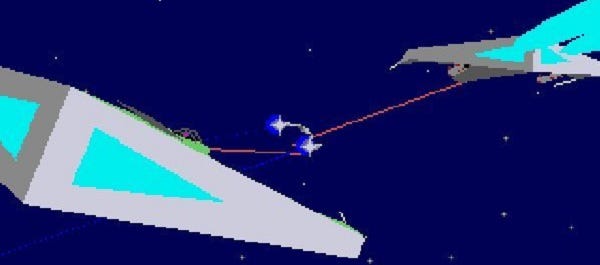Gaming Made Me: Frontier: Elite II
Braben the Bold
I still can't remember why I wanted it so much. I hadn't played the original Elite, and didn't even really think about picking it up when that want started. I wasn't even a space game fan. But I can remember asking my mum for it, and after a long, long wait it landed in my hands.
Frontier broke me. My understanding of how open it was didn't actually prepare me for how lost I would get in it, and how much that would taint other games (of its kind and tangentially similar) in my starstruck eyes. From the moment I looked back durning my first take-off, watching the Earth congeal on my screen, the bulk of planet sliding in from the edges, other space games were utterly ruined.
I was off on my first mission, flying into space to deliver a small package. Really. It was mundane, unexciting, but wrapped so completely up in a universe that felt so overwhelmingly large that I started to feel part of it. I missed out on the real world, my school's summer holidays, as I ferried packages between Sol and Barnard Star, earning a meagre wage as part of the Federation Military.
Its simplicity is often overlooked. Most space games are brutal on the fingers, but Frontier managed to pull off an RPG where you defined your own rules in a world of 100'000'000 stars without ever feeling complicated. Even with a Newtonian flight model. Not knowing any better, I just adapted to it, not realising just how remarkable the feats it was asking me to pull off were.
Delivering packages is one thing, but further along my military career I'd pick up missions that involved warping into enemy territory, the hated drug-smuggling, slavers of the Empire, and photographing their military installations. Frontier models solar systems, stars, planets, moons and asteroids. After arriving at a solar system a pinprick lightyears away would reveal itself to be a huge gas giant: terrifyingly large, hanging like a mallet over a nut over the moons it had captured in its gravitational pull.
On one of those moons there'd be an Empire base. I'd angle the ship, pulling the nose up to float into the atmosphere. I remember it was usually easier to cut the engines, gliding over the base in silence, floating down towards the planet. The base would detect me, scramble its fighters as I was snapping the photographs, waiting for the right moment to pull up and kick in the engines. Even though I liked snarling dogfights in the upper atmosphere, I'd usually pull up and out and engage the jump drive as soon as possible, and hope that they couldn't follow me.
But even those missions became slightly mundane. I cut my ties with the military after a bit, role-playing for the first and last time in my life, to move into a more mercenary business. The bulletin boards would offer up assassination missions. They'd offer up a time and place where the target would be, leaving a planet in a ship and it was up to me to decide when and where they'd die. If I messed up, they'd have an entire universe to escape into.
That excited me. Pondering the possibilities, looking at the nearby systems they could escape to, the type of ship they were in and what it was likely to be capable of. I fetishised every little detail up to the hit, which were often wonderful clusterfucks: parking my ship outside a spinning space station, watching the clock tick over, looking for the docking bay door to slip open and the target to emerge, I remember getting so excited I charged right in, not caring about the local police response. I leant too much on the thruster and slipped past the ship I was aiming for, ending up dashing my ship against the rear of the bay.
It's what gets to me about games that were inspired by the Elite series. Their complexity comes from dynamic economic models, ships with interlocking systems, politics. It drowns the genre in detail when all it needs is a nicely docking bay back wall to crash against.
The box is still on my desk. It has the manuals, the short story collection, the planetary Gazetteer and a card that I wrote a wormhole bug equation down on. Right now those numbers mean nothing to me, but back then I remember scanning the huge galactic map, exploiting my way further and further away from my home system. The last time I played it, I took my ship and warped and warped and warped and still the universe kept growing.
Every time I look over at it I want a new one that's exactly the same as the old one.











